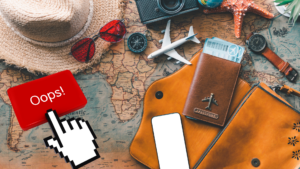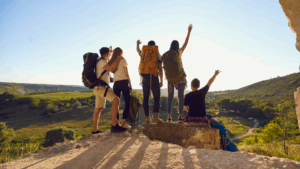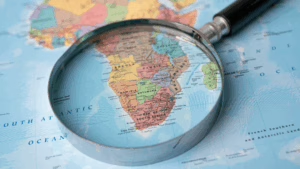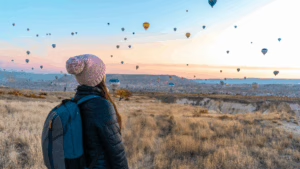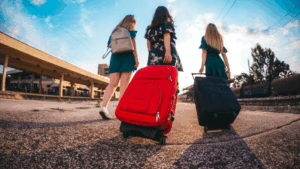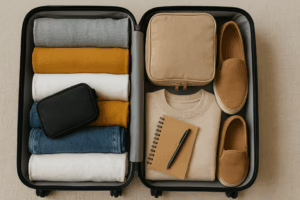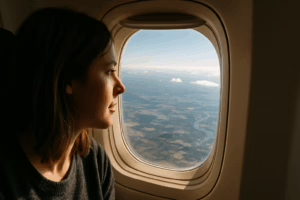Travel can open your world, but it can also test your immune system. Between long flights, new bacteria, sleep disruption and dietary changes, even the most seasoned travelers are vulnerable to illness. The good news is you don’t have to skip the street food, avoid local water entirely or carry a pharmacy in your carry-on. Staying healthy while traveling is entirely doable with some thoughtful planning and a willingness to adapt.
Build Immunity Before You Depart
Your travel wellness routine should start before you leave home. If you’re going overseas or somewhere with different pathogens, it’s smart to give your immune system a running start.
Begin by making sure you’re up to date on vaccinations—not just the required ones, but also the recommended. The Centers for Disease Control and Prevention (CDC) offers country-specific vaccine guidelines, which may include hepatitis A, typhoid or yellow fever depending on your destination. Some vaccines require more than one dose, so this is not a last-minute task.
Supplements like probiotics and vitamin C may help support gut and immune health, though experts say a nutrient-dense diet and adequate sleep are more critical. Dr. Lisa Lippman, a New York-based integrative health practitioner, recommends focusing on sleep hygiene and hydration starting at least a week before your trip. “You can’t supplement your way out of stress and exhaustion. Your body needs to be in balance before you introduce the chaos of travel,” she said.
Practice Smart Hydration
Dehydration is one of the most overlooked travel risks. Between dry airplane cabins, changes in climate and increased walking or sun exposure, it’s easy to fall short. Even mild dehydration can lead to fatigue, dizziness or make you more susceptible to illness.
Bring a reusable, collapsible water bottle and fill it after airport security. Apps like WaterMinder can help you track your intake. In regions where tap water isn’t safe, opt for sealed bottled water or use a filtration system like LifeStraw. Be wary of ice in drinks and unwashed produce, which may be rinsed with local tap water.
Electrolyte packets or tablets are a smart addition to your travel kit. Especially if you’re in a hot or high-altitude destination, they help restore balance quickly. Coconut water is also a natural way to replenish electrolytes—just check the sugar content if you’re buying packaged versions.
Eat Adventurously, But Wisely
Street food is often the heart of a country’s culinary culture. It’s affordable, flavorful and tells a richer story than five-star restaurants. But it also comes with a higher risk of foodborne illness if you don’t choose wisely.
The key is to observe, not avoid. Opt for stalls that are busy with locals, especially during peak mealtimes. High turnover means fresher food. Watch for vendors who cook in front of you, use gloves or tongs and have clean stations. Avoid food that’s been sitting out or kept lukewarm, as this is prime breeding ground for bacteria.
Foods that are boiled, grilled or fried on the spot are generally safer than raw dishes. If you’re unsure about local dishes, ask your hotel or guide for recommendations. Many seasoned travelers also carry activated charcoal or travel-sized digestive enzymes as a just-in-case remedy for minor food issues.
Move Your Body, Even a Little
You don’t need a gym to stay active. In fact, walking through a new city can be one of the most enjoyable ways to get exercise. Staying mobile helps regulate digestion, boosts mood and reduces the risk of stiffness and blood clots during long flights.
Set movement goals, even if it’s just 20 minutes of stretching or walking around the airport during a layover. If your hotel has a fitness center, take advantage of it—even a short workout can help offset jet lag. Apps like FitOn and Nike Training Club offer free workouts that require no equipment.
Yoga is particularly helpful for travelers. It improves circulation and sleep and relieves tension caused by long-haul travel. Some airports, like San Francisco and Dallas-Fort Worth, even offer dedicated yoga rooms.
Sleep Like Your Health Depends on It (Because It Does)
Travel disrupts your circadian rhythm, often leading to poor sleep. Jet lag, new environments and different time zones make quality rest hard to come by. But sleep is crucial—especially when your immune system is already under pressure.
Start adjusting your sleep schedule a few days before departure. Shift your bedtime earlier or later depending on your destination. On the plane, use a neck pillow, eye mask and noise-canceling headphones to create a sleep-friendly zone. Skip alcohol and caffeine during flights if you’re trying to rest.
Once you arrive, get exposure to natural light as soon as possible. This helps your body reset its internal clock. Melatonin supplements may help with short-term adjustment, but they’re not a cure-all. Consistent sleep hygiene—dark, quiet room, screen-free hour before bed—goes a long way.
Stay Prepared, Not Paranoid
You don’t need to pack an entire medicine cabinet, but a small kit with travel-friendly health items can save the day. Include basics like ibuprofen, antacids, hand sanitizer, bandages and any prescriptions you may need. If you’re going somewhere off the grid, consider adding rehydration salts, antihistamines or altitude meds.
One smart precaution: scan or photograph your prescriptions and medical documents in case you need a refill or run into a customs issue. Also, know where the nearest clinic or pharmacy is in each city you visit—especially in places where language barriers or limited infrastructure can slow down care.
If you do get sick, don’t panic. Rest, hydrate and give your body the time it needs to recover. Most travel bugs resolve themselves in a day or two. If symptoms persist or include high fever, dehydration or severe pain, seek medical help.
Embrace Mindful Travel
Stress can do as much harm as bad water. Rushing from place to place, dealing with delays or trying to stick to a rigid itinerary takes a toll. Mindful travel—being present, flexible and open—can improve your physical health just as much as your mental well-being.
Take breaks. Sit in a park. Journal your thoughts. Even five minutes of deep breathing can slow your heart rate and calm your nervous system. Travel is as much about being as it is about doing.
Building in time to decompress not only makes your trip more enjoyable, it helps your body adapt to change. You’re not just sightseeing—you’re living, breathing and experiencing. And that, more than anything, supports your overall wellness on the road.
TL;DR: Healthy Travel Made Easy
- Get vaccinated and rest well before your trip
- Stay hydrated, especially on long flights or in hot climates
- Choose street food vendors with clean practices and high turnover
- Move your body daily, even if it’s just a walk
- Prioritize sleep and manage jet lag with light and routine
- Pack a compact health kit with essentials and know where to get help
- Slow down and embrace flexibility to reduce travel-related stress
You don’t have to choose between adventure and wellness. With a few smart habits, you can explore the world and stay healthy while doing it—even if your trip includes that irresistible bowl of noodles from a street cart at midnight.




